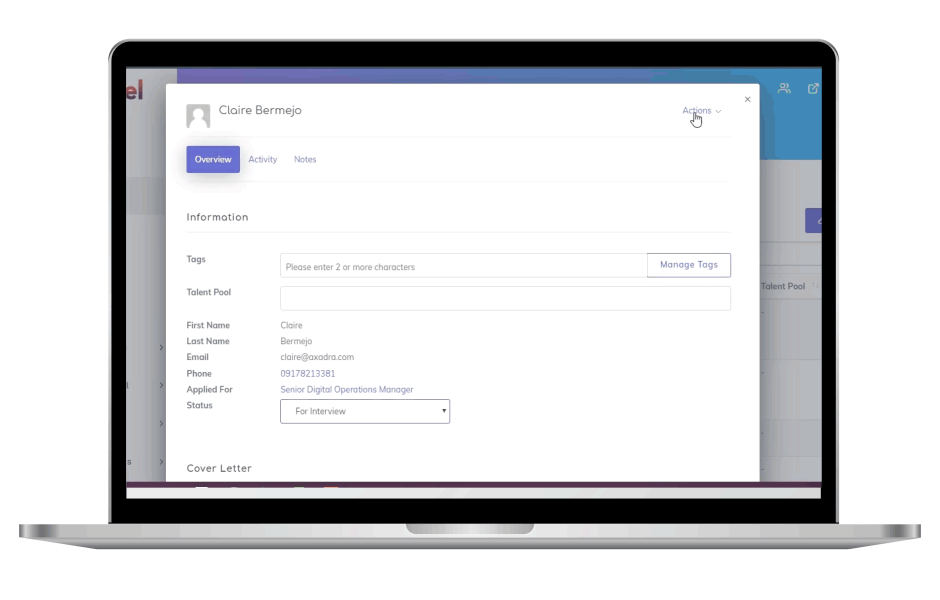Audit trails are essential for recruitment software because they ensure data security, accountability, and compliance with privacy laws. They track every action within the system – like candidate updates, interview schedules, and hiring decisions – providing a clear record of who did what and when. Here’s why they’re critical:
- Data Security: Protect sensitive candidate information (e.g., Social Security numbers, salary details) and reduce risks from insider threats and cyberattacks.
- Compliance: Meet legal requirements like GDPR and CCPA by maintaining detailed records of data access and changes.
- Accountability: Resolve disputes, investigate breaches, and ensure fair hiring practices with a reliable activity log.
- Risk Management: Detect unusual behavior, such as unauthorized access or bulk data downloads, and respond quickly.
With rising data breaches costing businesses millions, audit trails are a must-have feature for protecting recruitment data and staying compliant.
What Compliance Features Are Included in HR SaaS Solutions? | Legal And HR SaaS Stack News
Common Data Security Problems in Recruitment
Recruitment teams handle a treasure trove of sensitive information, from Social Security numbers to salary histories, making them prime targets for cybercriminals. In fact, the recruiting industry has become one of the largest repositories of sensitive data. These vulnerabilities don’t just expose private information – they also pose serious financial risks.
The numbers are staggering: the average cost of a data breach is $4.35 million, and cybercrime is expected to cost the global economy $10.5 billion annually by 2025. For recruitment teams, often operating within tight budgets, this could be a catastrophic financial burden. And with cybercriminals increasingly leveraging AI to craft sophisticated phishing attacks, the threats are only escalating.
Recruitment software faces a wide range of attack methods, including malware, ransomware, phishing, insider threats, and direct hacking attempts. The rise of hybrid work has only added to these challenges, as unsecured networks and compromised personal devices become weak points for attackers. Tools like audit trails can help recruitment teams track and mitigate these risks, but they require proper implementation.
Human error remains one of the most significant security vulnerabilities. Weak passwords, falling victim to phishing emails, and poor physical security practices often open the door to unauthorized access. On average, it takes 118 days to detect a data breach, giving attackers months to exploit recruitment data undetected.
What Happens When Recruitment Data Security Fails
When data security measures fall short, the consequences can be devastating. For perspective, in 2018 alone, 1,244 publicly reported breaches in the U.S. resulted in the loss of 446 million records.
The fallout from breaches extends far beyond lost records. Candidates’ personal information can be exploited for identity theft or fraud, leading to legal liabilities for recruitment teams. Additionally, nearly 70% of employees report losing trust in their employer after a data breach.
The financial toll is equally severe. Around 60% of small businesses shut down within six months of a data breach. Immediate costs often include forensic investigations, legal fees, notification expenses, and credit monitoring for affected individuals. On top of that, regulatory penalties hit hard, with nearly 60% of businesses facing fines each year.
Legal Requirements for Recruitment Teams
Recruitment teams must navigate a maze of privacy regulations governing how personal information is collected, processed, and stored. For example, the GDPR applies to any company handling data from European citizens – even those based outside the EU. This means U.S.-based recruitment teams often need to comply with both European and American privacy laws.
Failure to comply with GDPR can result in fines as high as 4% of global revenue or €20 million, whichever is greater. The regulation emphasizes lawful processing, transparency, purpose limitation, data minimization, storage limitation, and ensuring data integrity. Proper auditing is key to meeting these requirements and maintaining compliance.
In the U.S., laws like the California Consumer Privacy Act (CCPA) grant individuals rights over their personal data while imposing strict obligations on businesses. Recruitment teams must provide clear privacy policies, honor data deletion requests, and maintain detailed records of data processing activities.
However, compliance remains a challenge for many. Nearly 50% of small businesses struggle with outdated software, which can lead to violations. As regulations evolve, organizations are adapting. By 2025, 60% of companies will prioritize cybersecurity risks when working with third-party vendors.
"In the case of a decision based exclusively on automated processing, the recruiter must inform the persons concerned of their rights, and in particular that of obtaining human intervention in the recruitment process. In concrete terms, this means that a candidate has the right to have a human recruiter analyze his or her application to decide what action to take. If this is not respected, the recruiter is in breach with the GDPR." – Benjamin Greze, Lawyer
Looking ahead, 73% of organizations plan to invest heavily in technologies that strengthen data protection by 2025. This shift underscores how compliance requirements are reshaping the way recruitment teams approach data security and privacy.
How Audit Trails Improve Data Security and Compliance
Audit trails play a critical role in defending against cyber threats by meticulously recording every system interaction. They safeguard sensitive candidate data and ensure businesses stay aligned with regulatory requirements. This transparent recordkeeping lays the groundwork for understanding how audit trails uphold data integrity.
Protecting Data Integrity and Tracking Changes
Audit trails act as a tamper-resistant log of user actions, making it possible to verify and, if necessary, reverse changes. This becomes especially important when managing recruitment data, where accuracy and reliability are non-negotiable.
Every instance of access, modification, or deletion is logged with detailed precision, discouraging manipulation and unauthorized actions. When employees know their activities are being monitored, they are less likely to engage in risky behavior or attempt to bypass security measures.
"Audit trails are essential for ensuring data integrity, as they provide a clear and permanent record of all changes made to the data." – FDA Guidance on Data Integrity
These logs capture user interactions, changes, and events, maintaining unbroken data integrity throughout the recruitment process. For example, tracking updates to candidate profiles, interview notes, or hiring decisions allows recruitment teams to quickly identify and correct unauthorized changes. This level of traceability acts as a strong deterrent to tampering.
Monitoring Security and Managing Risk
Beyond preserving data integrity, audit trails bolster security by enabling real-time risk monitoring. They can detect unauthorized access and flag suspicious activities, such as excessive downloads or unusual login patterns.
In the event of a security breach, audit trails become invaluable. They help reconstruct the sequence of events, giving teams the insight needed to understand what happened and evaluate the scope of the incident.
"Audit trails are a digital safeguard, enabling your company to monitor and report on data access. By continuously logging interactions with documents, you gain visibility into who accessed what information and when, making it easier to detect irregularities or potential breaches. This level of detail strengthens overall cybersecurity and minimizes the risk of insider threats." – Joan Honig, Content Marketing Manager at DocuWare
Additionally, audit trails promote individual accountability. By tracking user actions, they encourage employees to adhere to security policies, reducing the likelihood of intentional rule-breaking.
Meeting Regulatory Compliance Requirements
Audit trails also serve as critical documentation for meeting data privacy and security regulations. They can pinpoint employees who fail to follow compliance guidelines, allowing organizations to address training gaps or policy violations before they escalate into costly penalties.
Comprehensive audit trail systems help businesses avoid fines by adhering to mandated requirements. They also ensure data accuracy and reliability, which are essential for audits, regulatory reviews, and informed decision-making.
For Skillfuel‘s recruitment software, these robust audit trails are key to meeting GDPR and other compliance standards, fostering trust among candidates and clients alike.
sbb-itb-e5b9d13
Key Features of Good Audit Trails in Recruitment Software
When it comes to recruitment software, audit trails do more than just tick compliance boxes – they provide a critical layer of accountability and security. Knowing what makes an audit trail effective can help your organization move beyond basic requirements and establish stronger data protection practices. Here are some features that stand out in ensuring transparency and reliability throughout the hiring process.
Time Stamps and User Identification
A good audit trail meticulously records every action with precise timestamps and detailed user information. These timestamps capture the exact date and time of each activity, while user identification logs include details like user IDs, IP addresses, device types, and roles. This level of detail ensures that every action is traceable, making it easier to investigate issues like unauthorized access or confirm adherence to hiring protocols.
"An audit trail is a detailed, chronological record whereby accounting records, project details, transactions, user activity, or other financial data are tracked and traced." – Vice Vicente
For organizations subject to regulations like SOX, maintaining at least 366 days of timestamped logs is mandatory. Accurate and synchronized timestamps across all systems not only enhance oversight but also lay the groundwork for secure, tamper-proof recordkeeping.
Secure Storage and Tamper Prevention
The reliability of an audit trail depends heavily on its resistance to tampering. Logs that cannot be altered after they’re created are essential for maintaining trust. Techniques like cryptographic hashing create unique digital fingerprints for each record, making any unauthorized changes immediately detectable. Digital signatures further verify data authenticity, ensuring that the information remains unchanged over time.
To safeguard these records, encryption and secure storage are crucial. Implement strict access controls to limit who can view sensitive data, and consider technologies like WORM (Write Once Read Many) storage, which physically prevents alterations after data is recorded. Regular backups and secure cloud storage also play a key role in preserving log integrity, even in cases of system failures or data breaches.
Automated Alerts and Centralized Dashboards
As recruitment activity scales up, manually monitoring logs becomes impractical. Automated alerts can step in, flagging suspicious behavior in real time – such as unusual login attempts, excessive data downloads, or unauthorized access. These alerts allow for quick action, minimizing potential risks to data security.
Centralized dashboards further simplify oversight by consolidating audit data into a single, user-friendly interface. Instead of combing through individual logs, recruitment managers can access real-time updates on workflows, pending tasks, and historical records at a glance. Role-based access controls ensure that each team member sees only the data relevant to their responsibilities – for example, HR directors can monitor compliance metrics, while recruiters focus on candidate progress.
These tools not only bolster data integrity but also streamline the ability to identify and address potential security concerns, keeping your organization aligned with regulatory requirements.
For users of Skillfuel, these audit trail features are seamlessly built into the platform’s centralized dashboard. This integration provides a clear view of recruitment activities while offering the security and compliance controls needed to meet GDPR and other regulatory standards with confidence.
Best Practices for Setting Up Audit Trails in Recruitment Software
Creating effective audit trails is all about balancing security, compliance, and usability. Success hinges on clear procedures, maintaining system integrity, and ensuring your team knows how to use these tools effectively. Below are actionable steps to help you maintain the integrity of your audit trails.
Regular Review and Access Control Updates
Access control reviews are a critical defense against data breaches. A staggering 82% of data breaches stem from credential theft, phishing attacks, or employee misuse and mistakes. This highlights why regular reviews of access permissions are essential for safeguarding recruitment data.
"A user access review is the process of systematically evaluating and verifying which systems, applications, and data each user in an organization can access. It ensures that access permissions align with users’ current roles and responsibilities, helping reduce security risks, prevent privilege creep, and maintain compliance with regulatory requirements." – StrongDM
When employees switch roles or departments, they often retain access to systems they no longer need. This creates vulnerabilities. For instance, a former Cash App employee exploited unauthorized access to download internal reports, leading to a data breach affecting 8 million customers.
To avoid such risks, conduct monthly or quarterly reviews of user access rights. Check that each team member’s permissions match their current responsibilities. Revoke access for terminated employees immediately and adjust permissions for those who have changed roles.
Implementing Role-Based Access Controls (RBAC) can simplify this process. Instead of assigning permissions individually, create predefined roles such as "HR Manager", "Recruiter", or "Compliance Officer", each with specific access levels. This approach ensures consistency and minimizes the risk of over-permissioning. Regular audits of access logs can then help identify and address anomalies early.
Regular Audits of Audit Logs
Audit trails are only useful if they’re actively reviewed. Systematic log audits, supported by automated alerts for events like failed logins, after-hours access, or bulk data exports, can help detect irregularities before they escalate.
Focus these reviews on key events that impact sensitive data, system security, and compliance requirements. Pay particular attention to changes in employee records, modifications to system settings, and updates to user access permissions. Document any anomalies and establish clear procedures for escalating and resolving issues.
For added security, store audit logs in a separate, secure location with strict access controls. Using write-once, read-many (WORM) storage ensures that logs remain unaltered after creation. Additionally, apply strong encryption to protect sensitive information within these logs.
Staff Training and Awareness
Without proper training, even the most robust audit systems can fall short. Educating your HR team on the importance of audit trails and how to use them effectively is essential for maintaining security and compliance.
Teach team members why access control policies matter and how their actions directly impact data security and compliance. Explain the potential consequences of policy violations, including legal penalties, financial loss, and reputational damage.
Train staff to access and interpret logs, recognize timestamps, and identify anomalies. Help them spot red flags, such as unauthorized access attempts or unusual data changes.
Develop clear policies and procedures for audit trails, ensuring they align with industry standards and regulations. Document logging requirements, data retention policies, and incident response processes. Make these documents easily accessible, and update them regularly to reflect regulatory changes or system updates.
Stay informed about the latest legal and regulatory requirements for audit trails and data retention. Laws like GDPR, HIPAA, and PCI DSS often include specific mandates for logging and monitoring. Ensure your team understands these obligations and knows how to meet them through proper practices.
If your organization uses Skillfuel, these best practices integrate seamlessly with its built-in audit trail tools. The platform’s centralized dashboard simplifies monitoring user activity, reviewing permissions, and maintaining comprehensive logs. By following these steps, you can ensure your audit trails not only meet regulatory standards but also protect the integrity of your recruitment data.
Why Audit Trails Are Required in Recruitment Software
Audit trails play a crucial role in safeguarding data security, ensuring compliance, and maintaining operational integrity. They act as a frontline defense against both internal and external threats. Their importance becomes even more evident when considering their role in preserving data integrity throughout the recruitment process.
From a legal standpoint, the necessity of audit trails is clear. For example, the Equal Employment Opportunity Commission (EEOC) recovered nearly $700 million for over 21,000 victims of employment discrimination in fiscal year 2024 – the highest recovery in recent EEOC history. Without comprehensive records detailing hiring decisions and candidate interactions, organizations risk facing expensive legal challenges.
"An airtight audit trail helps companies identify internal fraud by keeping track of the different users and the actions they take with regard to a company’s data and information. Audit trail records can also help identify outside data breach issues." – AuditBoard.com
Beyond compliance, audit trails serve as a deterrent against misconduct. When employees are aware that their actions are being monitored, they are far more likely to adhere to established procedures and policies. This fosters a culture of accountability, ensuring that every step in the recruitment process aligns with ethical and legal standards.
The financial risks of neglecting audit trails are substantial. Compliance gaps can result in fines of over $128,000 per day, while poor data quality costs companies an average of $15 million annually. These figures underscore the very real consequences of operating without proper documentation and oversight.
Audit trails also streamline incident investigations. Whether addressing a data breach, a discrimination complaint, or a violation of internal policies, detailed logs enable quick and effective responses. Without these records, investigations become more complex, leaving organizations vulnerable to unresolved issues and future risks.
Transparency provided by audit trails builds trust with stakeholders and reflects a commitment to ethical hiring practices. This is especially important in today’s hiring landscape, where 83% of employers and 99% of Fortune 500 companies rely on automated tools to manage recruitment. Verifiable records of how these systems function are essential for maintaining credibility with candidates, regulators, and business partners.
Platforms like Skillfuel demonstrate how audit trails can integrate seamlessly into recruitment workflows, turning compliance into a strategic advantage. By tracking every candidate interaction, system update, and user action, these tools create a reliable framework for accountability that modern recruitment demands.
In today’s regulatory climate, where legal pressures and security threats are ever-present, audit trails are not optional – they are essential. They provide the structure needed to navigate these challenges, ensuring recruitment operations remain secure, compliant, and sustainable.
FAQs
How do audit trails help recruitment teams meet GDPR and CCPA compliance requirements?
Audit trails are crucial for meeting the requirements of GDPR and CCPA, as they keep a comprehensive record of all activities involving candidate data. These logs capture details like who accessed or modified the data, the specific changes made, and the exact timing, ensuring both transparency and accountability in how information is handled.
By recording consent, monitoring data transfers, and facilitating swift responses to access or deletion requests, audit trails help recruitment teams stay compliant with legal standards. They also serve as critical proof during audits or investigations, showcasing adherence to privacy laws and reinforcing trust with candidates.
What are the essential features of an audit trail system for ensuring data security in recruitment software?
An effective audit trail system in recruitment software relies on several key features: accurate timestamping, user identification, and detailed activity logs. These elements work together to track every action within the platform, offering a clear record of who performed what action and when. This level of transparency ensures accountability at every step.
To strengthen security, it’s crucial to integrate access controls that limit unauthorized access. Additionally, encrypting audit data helps protect sensitive information, while cryptographic techniques ensure that logs remain untampered. By combining these measures, recruitment software can maintain the confidentiality and integrity of its data while aligning with established data security standards.
How can recruitment teams ensure audit trails improve accountability without compromising user privacy?
Recruitment teams can strike a balance between keeping detailed audit trails and respecting user privacy by enforcing strict access controls. This means only the right people – those who are authorized – can access sensitive information. Adding data encryption and adopting minimization practices further safeguards personal data while still allowing for effective monitoring of system activities.
By consistently reviewing audit logs, teams can spot potential security concerns without overloading systems with unnecessary data. Clear policies and adherence to regulations like GDPR or CCPA show users that their privacy is taken seriously and that the organization values transparency and accountability.












